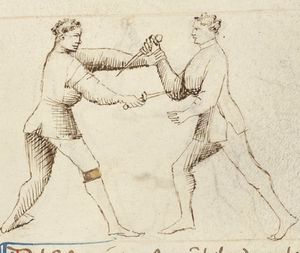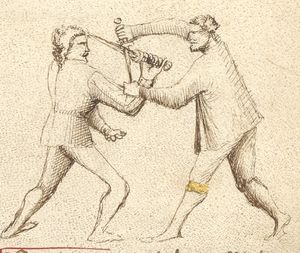|
|
You are not currently logged in. Are you accessing the unsecure (http) portal? Click here to switch to the secure portal. |
Difference between revisions of "Fiore de'i Liberi/Dagger/6th master"
| Line 4: | Line 4: | ||
! <p><includeonly><span style="font-weight:normal; font-size:85%;">[{{edit|Fiore de'i Liberi/Dagger/6th master|edit}}]</span> </includeonly>Images</p> | ! <p><includeonly><span style="font-weight:normal; font-size:85%;">[{{edit|Fiore de'i Liberi/Dagger/6th master|edit}}]</span> </includeonly>Images</p> | ||
! <p>Images</p> | ! <p>Images</p> | ||
| − | ! <p>{{rating|B|Translation (from the Getty and PD)}}<br/>by [[Colin Hatcher]]</p> | + | ! <p>{{rating|B|Completed Translation (from the Getty and PD)}}<br/>by [[Colin Hatcher]]</p> |
| − | ! <p>{{rating|none|Translation (from the Paris)}}<br/>Open for editing</p> | + | ! <p>{{rating|none|No Translation (from the Paris)}}<br/>Open for editing</p> |
! <p>[[Fior di Battaglia (MS M.383)|Morgan Transcription]] <span style="font-weight:normal; font-size:85%;">[[[Index:Fior di Battaglia (MS M.383)|edit]]]</span><br/>Open for editing</p> | ! <p>[[Fior di Battaglia (MS M.383)|Morgan Transcription]] <span style="font-weight:normal; font-size:85%;">[[[Index:Fior di Battaglia (MS M.383)|edit]]]</span><br/>Open for editing</p> | ||
! <p>[[Fior di Battaglia (MS Ludwig XV 13)|Getty Transcription]] <span style="font-weight:normal; font-size:85%;">[[[Index:Fior di Battaglia (MS Ludwig XV 13)|edit]]]</span><br/>Open for editing</p> | ! <p>[[Fior di Battaglia (MS Ludwig XV 13)|Getty Transcription]] <span style="font-weight:normal; font-size:85%;">[[[Index:Fior di Battaglia (MS Ludwig XV 13)|edit]]]</span><br/>Open for editing</p> | ||
Revision as of 19:47, 2 April 2015
Images |
Images |
Completed Translation (from the Getty and PD) |
No Translation (from the Paris) |
Morgan Transcription [edit] |
Getty Transcription [edit] |
||
|---|---|---|---|---|---|---|---|
[81] There is no man who knows more about dagger versus dagger than I. I am the Sixth [Dagger Remedy] Master and I tell you that this cover is good either in armor or without armor. And with this cover I can cover attacks from all directions and enter into all of the holds and binds, and strike to finish, as the students who follow me will show. And each of my students will make this cover, and then they will make the plays shown after, as they are qualified to do. |
[16r-a] ¶ Sesto Magistro che son digo che questa coverta e fina in arme e senç'arme. E cum tal coverta posso covrire in ogni parte. E intrare in tutte ligadure. E far prese e ferire segondo[1] che gli scolari miei vignirano a ferire finire. E questa coverta façça çaschuno mio scolaro. E poii faça li zoghi dredo che si po fare. |
[11a-e] De daga a daga non cognoscho homo che sia |
|||||
[82] I made the cover of the Sixth [Dagger Remedy] Master who preceded me. And as soon as I have made this grip I will be able to strike you. And because I position my left hand in this way, I will not fail to take away your dagger. I can also put you in the middle bind, which is the third play [3] of the First Dagger Remedy Master. I could also make other plays against you, without abandoning my dagger. |
[16r-b] ¶ I'o fatta la coverta del Sesto Magistro che m'e denanzi. E subito io fici questa presa per ferir te che far la posso. E a torti la daga non mi mancha per tal modo teglo la mia man stancha. Anchora ti posso metter in ligadura me-[!] mezana ch'e lo terzo zogo del primo Magistro çoe rimedio di daga. Anchora d'altri zogi te poria fare, senza mia daga abandonare. |
||||||
[83] From the cover of my Master which is so perfect, I have made this half turn from the cover of my Sixth Master and I have quickly positioned myself to strike you. And even if you were armored I would care little, for in that case I would thrust this dagger in your face. However, as you can see, in this case I have thrust it into your chest because you are not armored and you do not know the close range game. [In the Getty, the player's back is turned.] |
[16r-c] ¶ Meza volta o fatta tegnando la coverta del mio Magistro Sesto. E a ferirte so stado ben presto. E si tu fossi armado, pocha di ti faria cura, che questa daga te meteria in lo volto a misura. Ben che mituda te l'o in lo petto, perche tu non e armado, ne saii zogo stretto. |
[11b-a] Per la coverta del magistro ch'e tanto perfeto |
|||||
[84] With my Master’s cover and with a half turn to the outside, I have not abandoned the cover of my Sixth [Dagger Remedy] Master. I turn my left arm over your right. And moving my right foot at the same time as my left arm I turn myself to the outside. You are now partly bound, and you will have to admit that you will quickly lose your dagger. And I make this play so quickly that I have no concern or fear of your counter. [In the Paris, the Scholar wears a crown, and both he and his opponent have their right feet forward.] |
[16r-d] ¶ Del Sesto mio Magistro non habandonaii la coverta. Lo mio brazzo stancho voltaii per di sopra lo tuo dritto. E concordando lo pe dritto cum Lo brazo stancho voltandome a parte riversa. Tu e, mezo ligado, e la tua daga tu poi dire io l'o tosto persa. E questo zogo io lo fazo si subito che de contrario non temo, ne non ho dubito. |
[11b-b] Per la coverta del magistro cum meça volta di'fora |
[44r-b] ¶ Neclabor est nec pena mihi faciendo tenacem | ||||
[85] From the cover my Master made Having made the cover of my Master, I made this grip. And I can strike you whether you are armored or unarmored. And I can also put you into the lower lock of the first scholar of the Fourth Dagger Remedy Master. |
[16v-a] ¶ Fatta la coverta del mio Magistro i'o fatta questa presa. Armado e disarmado ti posso ferire. E anchora ti posso metter in ligadura soprana del primo scolar del quarto Magistro rimedio di daga. |
[11a-f] Per la coverta che a fato el mio magistro |
|||||
[86] Without abandoning the cover of the Sixth [Dagger Remedy] Master, I make this turn [with my dagger]. Your right hand will lose the dagger, and seeing that you have been reversed, my dagger will quickly strike you, and your dagger will be lost to you. Also I can make a turn with my left arm and make you suffer in the lower lock. |
[16v-b] ¶ Non abandonando la coverta del Magistro Sesto, i' fazo questa volta. La mano tua dritta per perder e la daga, e vedi che tu la riversi, la mia subito ti ferira, e la tua daga da ti sera persa. Anchora tal volta cum lo brazo stancho posso fare che in la sotana ligadura ti faro stentare. |
||||||
[87] If you and I are both armored,
[This play has been moved to its proper location as given in Fiore's explanation.] |
[16v-d] ¶ Ben che sia posto dredo lo contrario del Sesto zogo io vo per rasone denançi de luii, per che io son so scolaro e questo zogo si e suo zoe del Magistro Sexto. E vale piu questo zogo in arme che senç'arme, pero fiero costuii in la mano, per che in quello logo non si po ben armare. Per che se uno e disarmato çercheria de ferirlo in lo volto o in lo petto. Overo in logo che pezo gl'avenisse. |
[12a-a] Siando ti armato e mi armato |
|||||
[88] With my left hand placed in my defense as shown, [This Master is missing his crown.] |
[11b-c] La man stancha o'metuda a'tal deffesa |
||||||
[89] With my left hand I will turn you and expose you I make the counter-remedy of the Sixth King [Dagger Remedy Master], turning your body with an elbow push, and in this way I can strike you, because with this elbow push that I quickly do, I will be able to defend against many close plays. And this is a particularly good counter-remedy to the all of the holds of the close-range game. |
|
[11b-d] Cum la man mancha e ti faro voltar o discovrire |


